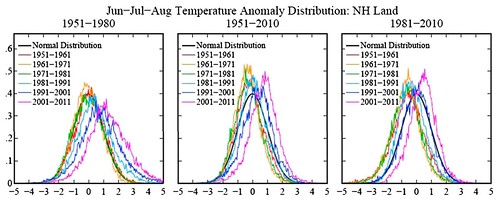 Global warming makes the globe get warmer on average, with - naturally enough - year to year variabililty. If you're interested in detecting GW then looking at the average is best, because its a nice stable statistic amenable to analysis. But it is also a pretty boring statistic, since it's gone up by ~1 oC in the last century, leaving people prone to respond "is that it? Temperature changed by 10 oC during the course of today", or whatever. So people tend to prefer to find something more exciting to talk about.
Global warming makes the globe get warmer on average, with - naturally enough - year to year variabililty. If you're interested in detecting GW then looking at the average is best, because its a nice stable statistic amenable to analysis. But it is also a pretty boring statistic, since it's gone up by ~1 oC in the last century, leaving people prone to respond "is that it? Temperature changed by 10 oC during the course of today", or whatever. So people tend to prefer to find something more exciting to talk about.One obvious thought is that perhaps, as well as the mean climate shifting, the distribution might too. For example, the left hand plot in my pic above, where we see that, for 2001-2011, not only is the mean higher but the curve has broadened, thereby strongly increasing the number of hot events (this is Hansen's stuff1; there's an animation here). However an obvious counter to that is: is that really what you expect? Why would it be so? IPCC AR6 sez "B.3 Continued global warming is projected to further intensify the global water cycle, including its variability, global monsoon precipitation and the severity of wet and dry events" but doesn't obviously say anything similar about temperature. But I've only skimmed it, and might have missed it.
We further notice that if you use a 1981-2010 reference period, you get strikingly different results: with that, the most recent period has less variablity. The paper notes this, and waves its hands, saying "Use of a recent base period alters the appearance of the distribution. Climate variability increased in recent decades, and thus the standard deviation increased. Therefore, if we use the most recent decades as base period, we “divide out” the increased variability. Thus the distribution function using 1981–2010 as the base period (Fig. 9, Right) does not expose the change that has occurred toward increased climate variability". But that doesn't explain it for me.
I finally got round to writing this post because of a tweet from SR, which says "This increase in extreme heat basically results from the same random weather fluctuations around the mean climate, just shifted by warming of the mean climate" which appears to directly contradict H. I'd be interested in other opinions.
Notes
1. Hansen is still pushing his stuff, but still relying on the 2012 results, and doesn't ref anything from the IPCC.
No comments:
Post a Comment